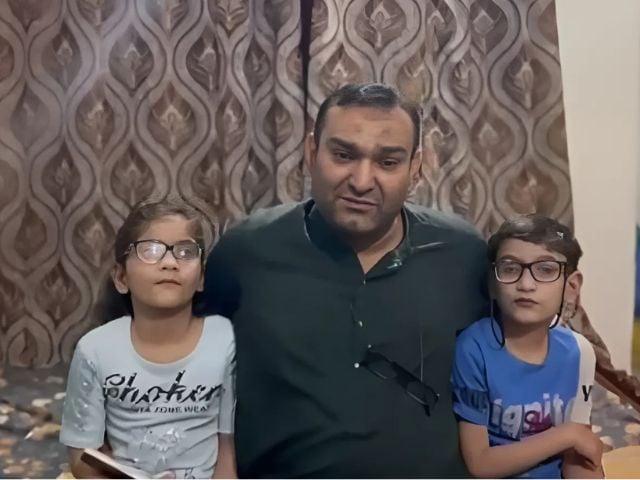The father two children who were sent back by India last week have praised Chief of Army Staff General Asim Munir for taking responsibility for the treatment of the ailing children.
The children, Abdullah (9) and Mansa (7), both suffered from congenital heart disease, had traveled with their father, Shahid Ahmed, to Faridabad, India, in April for life -saving surgery.
Following successful pre-surgical evaluations on April 22 and 23, the family was ordered by India’s foreigners regional registration office on April 24 to leave the country within 48 hours.
The expulsion came in the wake of the Pahagam attack in the Pahagam area of Indian illegally occupied Jammu and Kashmir (IIOJK), after which the Indian government took the controversial step of deporting even Paskistani patients undergoing treatment.
Shahid Ahmed, resident of Hyderabad, Sindh, condemned the decision and called it “inhuman and unethical.”
“There is no religion that is greater than humanity. Even Hinduism teaches compassion,” he said, adding that it took him seven years to secure an Indian visa for his children’s treatment.
As they returned to Pakistan, General Munir facilitated children’s admission to the Armed Forces Institute of Cardiology (AFIC) in Rawalpindi. Shahid expressed deep gratitude to the army chief and said that the care at AFIC has far exceeded his expectations.
Dr. Mehboob Sultan from AFIC confirmed that both children suffer from tetralogy of Fallot, a congenital condition involving heart defects and underdeveloped pulmonary arteries.
Their treatment will include phase operations where the first phase is set to take place in the coming days.
Brigadier Dr. Khurram Akhtar stated that AFIC is fully equipped to treat complex heart conditions in children and comply with international medical standards. “It is not necessary to send such cases abroad. We have performed several successful operations here,” he added.
Tensions between India and Pakistan reached new heights after a deadly attack on April 22, 2025, when 26 men were killed at a tourist site in Pahaldam, in Indian illegally occupied Jammu and Kashmir (IIOJK). India quickly accused Pakistani elements of the attack, but no evidence was presented to support the claim that Islamabad severely denied.
In response to the attack, India’s Cabinet Committee for security approved several retaliatory measures on April 23, including the closure of the Wagah-Attari Land Transit Point, a travel guide that calls on Indian citizens to avoid being avoided suspending the Indus Waters Treaty and the recall of several categories of VISA’s Pakistani Nationals.
On April 24, Pakistan’s National Security Committee (NSC) issued a strict warning and declared that any attempt from India to block the water flow in Pakistan would be considered an act of war. NSC also approved the closure of the Wagah boundary transition.
The day after, on April 25, the Pakistan senate unanimously adopted a decision that rejected India’s allegations of the Pahagam attack, and called them baseless and politically motivated.
Tensions escalated further on April 26 when the Pakistani High Commission in London was vandalized during a protest by hundreds of Pro-India and Pro-BJP protesters.
The protesters caused material damage, including broken windows and spraying of saffron paint. Pakistan accused India of encouraging the violence, with the Federal Minister of Information Information Attaullah Tarar, who condemns the actions as supported by “Indian State and Agencies.” British police later arrested two people suspected of involvement in the incident.



